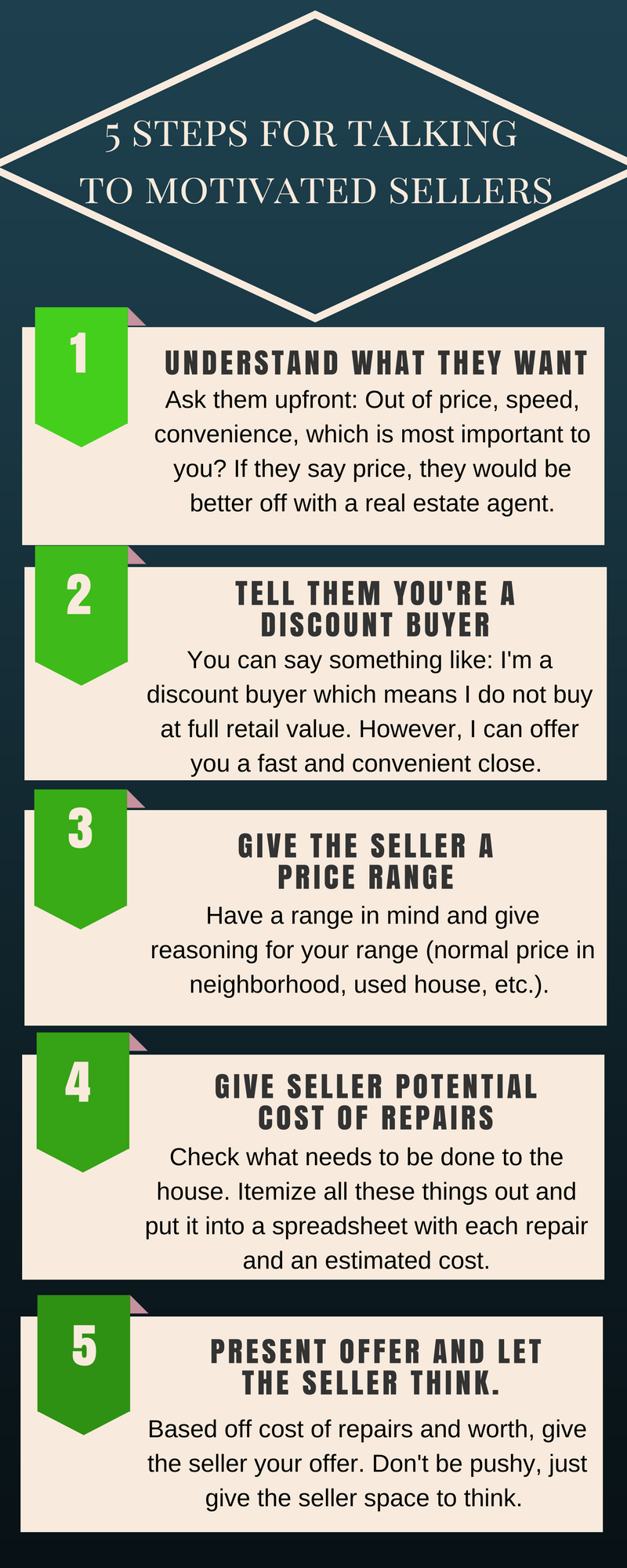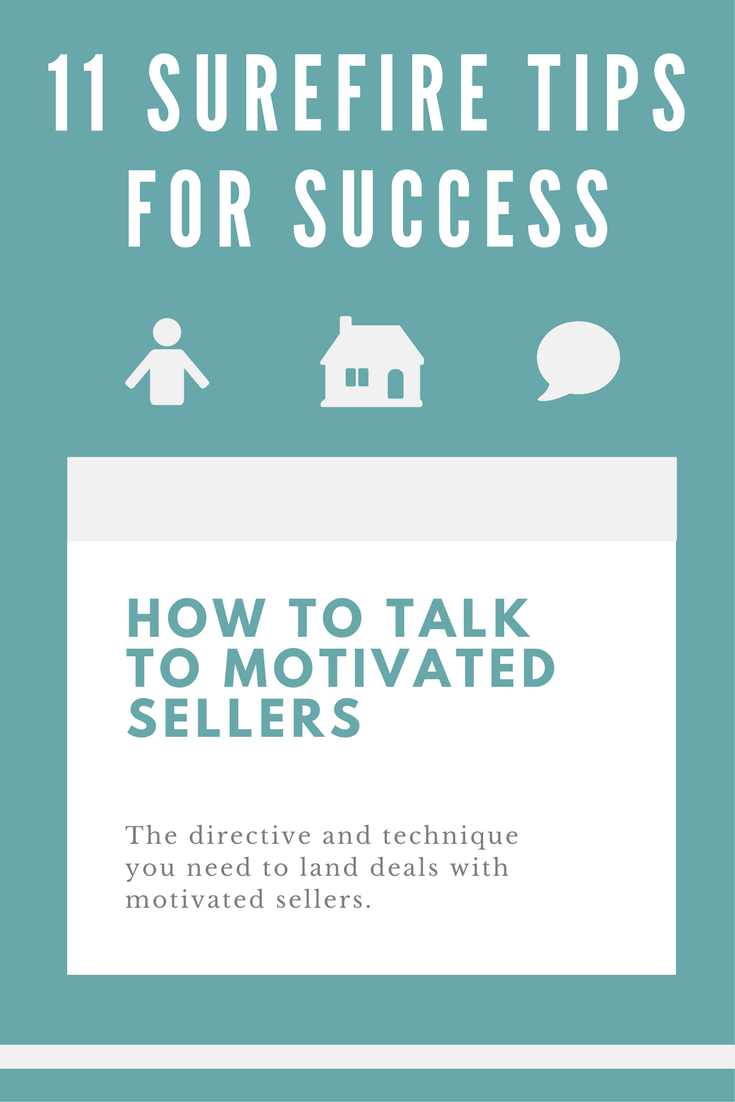How to Talk to Motivated Sellers: 11 Surefire Tips for Success
Approaching deals with motivated sellers is tricky. As a seasoned real estate investor, I know that you don’t just get lucky every time with those deals – you must have some directive and technique to handle motivated sellers. Here are 11 reliable tips to arm yourself with when making deals with motivated sellers…..
#1 Be confident.
The most important thing to keep in mind when talking to motivated sellers is your mentality or your mindset going in.
First off, you want to be positive that you’re going to get the deal. I’ve suffered from being negative and very self-doubting. But for all the times I went in feeling very confident and good about a deal, I walked in and I got the deal. For all the times I was negative, I didn’t get any deals.
You have to be confident in yourself, and it’s difficult to do when you’ve never done any deals before. You have to realize that the more you do deals, the better you get at it. It’s just a part of sales. You can’t expect to score a $30,000 deal from the very first person you talk to.
For the vast majority of people, they don’t get that lucky on their first try. The thing is, you’re going to stumble on the phone. You’re going to stumble when you meet the sellers. You’re going to stumble when you make an offer.
It all just takes practice. You get up, you fail, and you try again and again and again, until you succeed.

# 2 Aim to create a win-win-win scenario.
Irrespective of the home value, understand that you’re not just there to get a deal, you’re there to help the person. You must try to find a win-win-win scenario.
The seller wins because they have a need and you’re fulfilling that need by buying or wholesaling their house. You win because you’re a wholesaler and earning money through your assignment fee.
The buyer wins because they’re getting a property at a discounted rate that meets their buying criteria. This is usually the best case scenario you should strive for.
#3 Prioritize the sellers.
In the end, you want to help out the sellers because more often than not, they’re the one in the distressed situation. When someone tells you, I have met a lot of buyers who have asked me to sell my home, most times they normally have to sell their house because they’re in the midst of a divorce or a foreclosure – all the reasons for a motivated seller.
Make the sellers your focal point. You must set an expectation of helping the sellers. If you come in genuinely, authentically and with integrity, the sellers will recognize that. Sellers can easily see through the pushy people who are just in it for a deal.
Imagine a pushy salesman versus someone who’s just there to help you. Who are you more likely to do business with?

#4 Be honest about your intentions.
For the investment property, when you’re giving the seller 50 or 60 cents on the dollar for the house, it’s difficult to present that in a way that seems like you’re helping the seller. But, you just need to be honest.
When a motivated seller calls me, first I make sure to thank them for sharing their information with me. Then, I tell them a little bit about myself and say something like, “I’m a discount buyer. I want to be clear with you. I’m a discount property buyer, which means I do not buy at full retail value. However, I can offer you a fast and convenient close.” This makes my intentions clear.
One important question to ask sellers upfront is: “Out of price, speed, and convenience, which is most important to you?” If the seller says price, I tell them flat out that I’m probably not the best buyer for them and that they would be better off going with a real estate agent.
Sometimes you can even ask the sellers outright why they don’t want to go with real estate. I had one lady who just didn’t want to go through the trouble of showing her house.
Another gentleman came to me because he and his wife were just too busy. He actually wanted retail price, but I told him upfront that I couldn’t pay that. Because he understood where I was coming from and because I had been upfront about my intentions, he wasn’t upset.
#5 Give the seller a price range.
Whenever you have a conversation with a seller, you should generally have a range in mind. Let’s say that a house is worth hundred thousand. I may say that I’ll buy for $40,000, and I’ll tell them it’s because of the normal price around the neighborhood or because people normally don’t take care of the houses as they should. If I go up to $70,000, I may factor in how much we make and the repairs and all.
It’s not so much about the price you say, but how you say it and the reasons you give for the price.
Be upfront about this expected price range with the seller. If the seller had responded to me that they want $95,000, I would have told them that I’m probably not the best buyer for them. However, if they say “Maybe,” you know there’s an in and that the seller is at least considering the price range.
It’s helpful to give the seller some kind of expectation so that they’re ready if I need to tell them that the house will actually only go for $60,000. Be as upfront and honest as possible about this price range. That way, the seller won’t be surprised by the future.
Other schools of thought: Give a number, ask for a number.
If you don’t want to give a range to the seller, some other investors employ different methods. One option is to ask the seller for how much they want for the house and never to go for their first number. In a good situation, the seller may tell you they want $70,000 when you were actually willing to pay $100,000.
In a more realistic situation, the seller may tell you they want $100,000 and you say that you can give $70,000. The seller will realize they must bring down their price and offer $80,000. In this kind of situation, you must negotiate and the seller will recognize that they need to expect less money.
Another option is to give the seller a number. You can tell the seller that this is exactly how much you are willing to pay so that you set their expectations.
I tread the line between these two options by giving them a general price range. It’s easier to tell a person whose house is worth $100,000 that you can get them a range between $40,000 to $70,000. They at least have an idea and it’s not a slap in the face if you actually give them $50,000.
#6 Give them a spreadsheet of potential costs for repairs.
When you meet them in person at the house, make sure to check what exactly needs to be done to the house. Do they need a new roof? Are there foundation issues? Do they need a new AC? You need to go and itemize all these things out, and put it all into a spreadsheet with each repair with an estimated cost.
Give the spreadsheet to the seller so they can see how much it will cost to fix the house. I make sure to tell them, “If you think we can do any of these things for cheaper, give me that person’s number.” A lot of times, the sellers will take you at your word because you’re supposed to be the expert.
#7 Have control over the conversation.
The seller may tell you that they think their house is worth a hundred thousand dollars and want to sell through a real estate agent. You need to be the expert in controlling the conversation and tell them outright that it may be worth 95 to a hundred in the area, but in order to get it there, the seller may have to spend another $15,000 to fix it.
The seller may also have to wait a large amount of time, to deal with contractors and subcontractors, and then also pay the real estate agent 6% and the closing cost is another 2%.

Knock off all these numbers and make the seller realize that their house may not be exactly worth what they thought. You do have to leave the decision of going with you or a real estate agent up to to the seller. But you can try to convince the seller by taking ownership of the responsibilities.
Make sure to tell the seller that you’re going to be the one dealing with all of the headache and complications and that the seller will be able to leave knowing that they don’t have to deal with any of this anymore. Because they’re a motivated seller, this fact may be enough.
#8 Be understanding if it doesn’t work out.
Knowing that you will take care of all the trouble may be sufficient for many motivated sellers, but be empathetic and understanding if the seller doesn’t want to move forward with you.
It may feel like a slap in the face to the seller to hear that they can only get 50,000 for a house they thought was worth a 100,000. Understand where the seller is coming from and be kind and polite to them even if they don’t want to do business with you.
#9 Give the sellers space to think.
I’ll develop this point with an anecdote. One year ago, I remember speaking to a woman even going to her house, but she wasn’t ready to sell her back then.
I accepted it and went on my merry way…
She then calls me two weeks later and says that she had spoken to a lot of other people, but I was the only one who wasn’t pushy and was very polite to her.
When I started looking at her house again, I gave her a price range. Even though she wanted more than I could give her, I didn’t push her. I just said, “This is my number. This is why I’m giving you the number I have and I’ll let you think about it.
Take your time and consider what your options are. Let me know if you have any questions. I will answer them as needed.” I call her two days later to follow up. She still wanted a little more, and I already knew I had some room because I had given my own number.
So, I gave her a little more, and she immediately says, “Yes. Thank you. That’ll work.” The deal worked because I gave her time and I was able to read her. I had to give her space to process the situation and consider the number I gave her.
#10 Don’t bring the seller down.
If the seller is a motivated seller, they probably have a problem. When someone has a problem and they’re trying to dig themselves out of it, the last thing you want to do is bash on their house.
Compliment their house and tell them that you’re going to try to get them the higher end of the price range you gave them earlier. It makes the seller feel better, and that’s what you want.
#11 Last but not least… be the seller’s friend.
Consider the needs of the sellers and put them ahead of yours. Even if you make a ton of money, understand what their problem is and try to alleviate that first. If you can’t help them with their problem, there’s no point in you trying to make money. You must be gracious with the sellers. People like doing deals people they like.
Most of my referrals come from the people I did deals with who liked me as a person. The seller may have an investor who offers them a higher price, but they may take a lower offer from another investor simply because the seller likes that investor better.
Be somebody who recognizes the needs of the sellers and genuinely wants to help those sellers out. The seller will do their deal with a friend, even though their friend can’t pay them more than another person just because they like their friend.
Be the seller’s friend, and you can’t go wrong.








